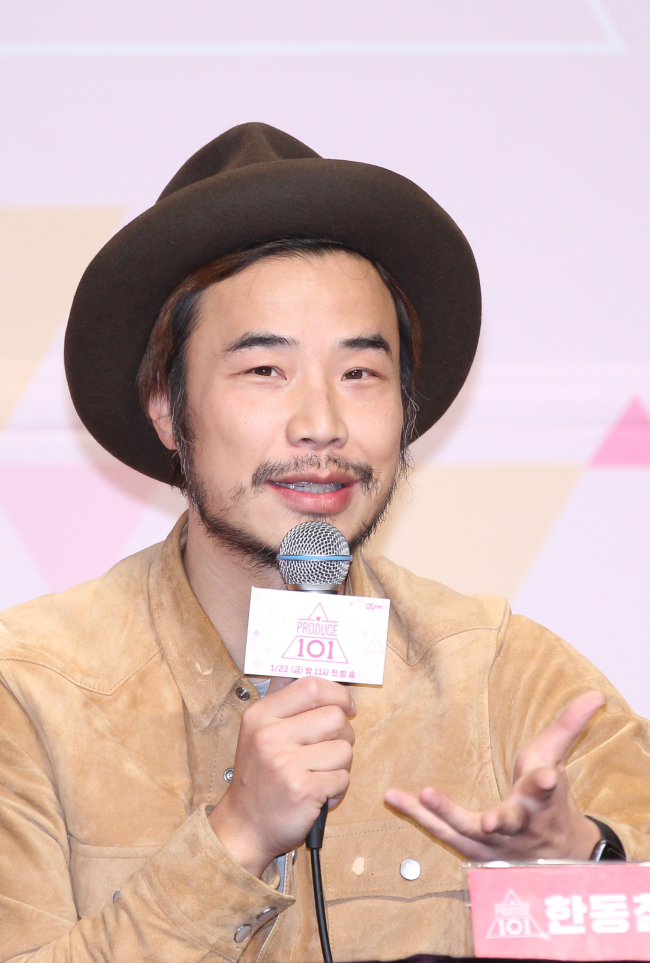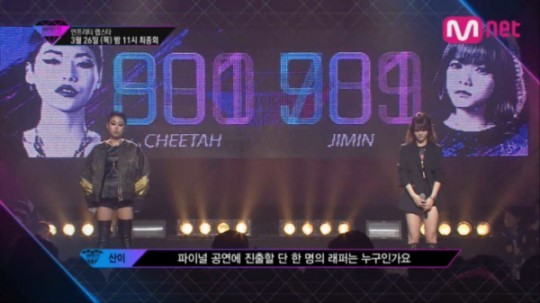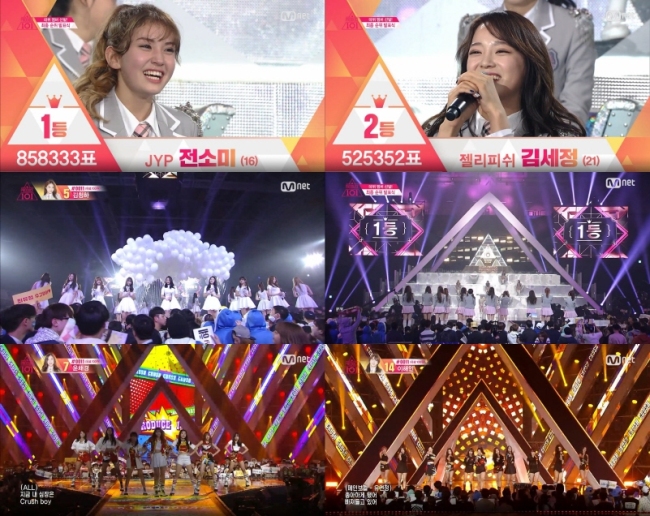When Korea’s rap competition series “Show Me the Money” aired in 2012, it was the first and only television program here which showcased Korean rappers to the public.
The program uncovered not only underground rappers like Loco, but also introduced major rappers from the mainstream hip-hop scene, such as Swings and Basick, to a wider audience.
Hip-hop is now an integral part of Korean pop music, which has long been dominated by idol dance music and ballads.
 |
Producer Han Dong-chul speaks at a news conference for “Produce 101,” a reality girl group competition show that aired on Mnet from Jan. 22 to April 1. (CJ E&M) |
“I wanted to introduce a variety of music genres to people and tell them this (hip-hop) is good music and you should listen to it,” said Han Dong-chul, Mnet’s chief producer of “Show Me the Money” and “Produce 101,” in an interview with The Korea Herald on April 8 at CJ E&M headquarters in Seoul.
Han’s goal was to get more people to listen to hip-hop music, which he felt had been neglected in Korea’s mainstream pop music scene.
“I like hip-hop. But I didn’t know much about the music. I had the chance to listen to a hip-hop song titled ‘Walk This Way’ by Aerosmith and hip-hop artists. It was so good. So I began to learn about hip-hop music,” said Han, 46.
Han’s first program involving rappers and hip-hop music was “Hip Hop the Vibe” in 2000, which featured underground rappers performing. It didn’t last long, but he didn’t stop there, continuing to think of ways to make hip-hop music programs interesting.
 |
Teaser images for “Show me the Money” season 5 (CJ E&M) |
“Show Me the Money” has been a great success. Compared to their predecessors, rappers featured on the program have been given more opportunities to perform on stage and to release albums. They also collaborate more with idol singers and other musicians. More rap songs top music charts these days.
“My goal was to let people know that there is more than just idol dance music in Korea. As I introduce new artistes who make other types of music, I also hope to see more hip-hop fans and to see this program inspire young people to create rap songs,” he said.
As the popularity of rappers soared in Korea, K-pop fans abroad also began to discover a new side of Korea pop music.
The 2015 hallyu report by the Korea Foundation highlighted Korean hip-hop as a new trend in the Korean culture wave. The report said the popularity of Korean hip-hop had spiked in 2015 with a series of sold out overseas concerts by some of the hottest hip-hop musicians including G-Dragon, Zico of Block B and Rap Monster of Bangtan Boys.
Han personally felt the growing presence of Korean hip-hop abroad at the Los Angeles concert of “Show Me the Money” last year.
 |
Participants stand in line for hours during the preliminary for "Show Me the Money 5" in Seoul in March. (CJ E&M) |
“There were not only Korean-Americans, but also local Americans at the concert. I was so surprised to see them enjoying Korean hip-hop music in the birth country of hip-hop music,” said Han.
Following the huge success of the Los Angeles concert, the show held its first preliminary competition for season five in Los Angeles in March. Some 2,000 people showed up.
“I met some hot rappers in the LA hip hop scene. Most of them were second and third generation Koreans. Their level was so high,” he said.
The preliminary competition for “Show Me the Money” season five drew more than 10,000 participants, including Korean comedian Jeong Jun-ha. Jeong participated in the competition as part of a mission for the TV program “Infinite Challenge.”
In “Show Me the Money,” rappers compete under the guidance of established rappers from the mainstream hip-hop scene. They perform and compete to win audience votes as well as prize money. In season four, the show featured Snoop Dogg, who oversaw contestants in a freestyle rap battle.
“There might be another Snoop Dogg-level figure in the new season. But you should check in with the show,” Han noted.
 |
Poster for "Unpretty Rapstar 1" (CJ E&M) |
In the process of discovering talented Korean rappers, Han’s attention also turned to female rappers and he recruited them exclusively for the show’s spin-off “Unpretty Rapstar.” Its first season aired in January 2015 and season three is expected to air after “Show Me the Money 5” completes its run.
“There are not many female rappers, even in the U.S. I think women have a physical handicap in how much impact their voices can have compared to men. Despite this, there are so many talented women rappers who have the potential to make progress,” said Han.
The first season of the all-women rap battle last year created stars such as Jessi and Cheetah. “Unpretty Rapstar” not only discovered unknown female rappers, but also created more collaborations between them and other musicians. Cheetah, from the show’s first season, recently appeared in “Produce 101” as a rap teacher for trainees in the girl group competition show.
“I hope there are teenage girls who dream of becoming rappers in Korea after watching ‘Unpretty Rapstar,’” Han said.
 |
A scene from “Unpretty Rapstar 1" (CJ E&M) |
Recently, Han featured teenagers who aspire to become part of a K-pop girl group in the reality competition show “Produce 101.”
The program follows the making of a K-pop girl group from beginning to end. It kicked off in January with the ambitious goal of forming “the next generation, big scale girl group that will represent Asia,” as stated in its official website.
A total of 101 female trainees from 46 local entertainment agencies participated in the competition program with the goal of being selected for the 11-member girl group.
“I have seen so many talented trainees who don’t get a chance to debut. We used our connection with entertainment agencies, singers and musicians to give them opportunities to show their talents,” said Han.
Contestants were given missions and competed either against one another or in groups to gain viewers’ votes. Votes determined their ranking in the quest to become the top 11.
 |
Scenes from the final episode of "Produce 101" (CJ E&M) |
A few Chinese broadcasting companies showed great interest in the program format, Han said.
“They may find the program format interesting, but it’s the cast that is interesting too,” he added.
Han is of the opinion that there has not yet been a girl group that enjoys as much popularity overseas as boy bands such as Big Bang and Exo. He hopes that one day there will be a girl group on the level of the two most representative boy groups in K-pop.
“Produce 101” seemed to attract global viewers, as there have been comments in English and Japanese on the official Facebook and Instagram pages of the program, according to the media and promotional team of CJ E&M.
There has been criticism of the intense competition among the young teenage girls, but fans also emerged for some of the show’s contestants.
“What’s wrong with working hard to win in the competition? Young people live like this in real life too. I live a competitive life to keep my job. Everyone does,” said Han in response to criticism about the show.
 |
Poster for "Produce 101" (CJ E&M) |
“They were not forced to be in the competition. They did their best, shed tears and worked hard to achieve their dreams,” he added.
Han said the reason people could relate to the program was that it had drama -- a low-ranking contestant could jump to the top after working hard and subsequently deliver a better performance.
“One of the things I am interested in is the unexpected winning. Everyone assumes Usain Bolt will win a race, but if someone beats him, that comes with great joy and emotion,” he said.
Han and his team plan to create season two featuring young men who aspire to be members of a boy band.
By Lee Woo-young (
wylee@heraldcorp.com)
This is the 11th article in a series that explores the driving forces behind hallyu and the global rise of Korean pop culture. -- Ed.






